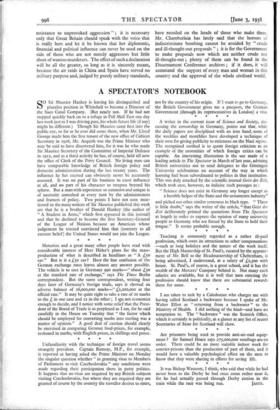A SPECTATOR'S NOTEBOOK
SO Sir Maurice Hankey is leaving his distinguished and pluralist position in Whitehall to become a Director of the Suez Canal Company. (But nearly not. If he had not stepped quickly back on to a refuge in Pall Mall East one day last week just as I was driving past, his whole future life (if any) might be different.) Though Sir Maurice came first into the public eye, so far as he ever did come there, when Mr. Lloyd George made him the first tenant of the new office of Cabinet Secretary in 1916, Mr. Asquith was the Prime Minister who may be said to have discovered him, for it was he who made Sir Maurice Secretary of the Committee of Imperial Defence in 1912, and as a third activity he has, of course, held till now the office of Clerk of the Privy Council. No living man can have comparable knowledge of British foreign policy and domestic administration during the last twenty years. The influence he has exerted can obviously never be accurately assessed. It was no part of his business to exert influence at all, and no part of his character to trespass beyond his sphere. But a man with experience so extensive and unique is of necessity consulted at every turn by the administrators and framers of policy. Two points I have not seen men- tioned in the many notices of Sir Maurice published this week are that he is a brother of Donald Hankey (the author of " A Student in Arms," which first appeared in this journal) and that he declined to become the first Secretary-General of the League of Nations because an American whose judgement he trusted convinced him that. (contrary to all current belief) the United States would not join the League.


















































 Previous page
Previous page